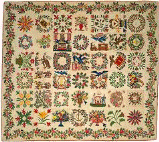Textile Society of America

Textile Society of America: Symposium Proceedings
Date of this Version
2000
Document Type
Article
Citation
In Approaching Textiles, Varying Viewpoints: Proceedings of the Seventh Biennial Symposium of the Textile Society of America, Santa Fe, New Mexico, 2000
Abstract
This presentation describes how artisans in The Gambia, West Africa, continue to employ the cultural traditions of tie dye, batik, and embroidery in the patterning and construction of clothing in the modem global economy. I came to the United States to attend college where I majored in finance. After graduating, I chose to apply my knowledge and training as an entrepreneur first in the Washington, D.C. area where I operated several hair braiding salons. Later upon returning to The Gambia, I established a tailoring studio where I employ several tailors and embroiderers, about five on the average. I chose this enterprise because I have always loved fashion and had identified a potential customer base while residing in the United States. While I have total management responsibility doing all of the purchasing, marketing, supervision of production, and much of the design as required by the enterprise, I am fortunate to have the assistance of my husband, a computer specialist, in managing logistical arrangements.
With the exception of prints made in Senegal and Cote d'lvoire, most of the fabrics which I used are purchased and dyed in The Gambia. (Note: Numbers in parentheses in the text which follows correspond to the photo montage entitled "Contemporary Dyeing and Tailoring in The Gambia.) The undyed damask or brocade used for most tie-dye or batik in The Gambia is imported from the United Kingdom. , China2 or India and is retailed by citizens of Lebanese descent living in the Gambia. (1,2) The fabric used is generally 100 percent cotton. Dyers who usually purchase the damask for dyeing can tell if the fabric will take dye well by breathing through it: if condensation penetrates the reverse side, it means the cloth will dye well. Cotton fabrics retail from $1.95 to $12.00 per yard. The upper limit includes silk-cotton blends. These prices are negotiable and depend upon your bargaining skill.


Comments
Copyright © 2000 by the author(s).